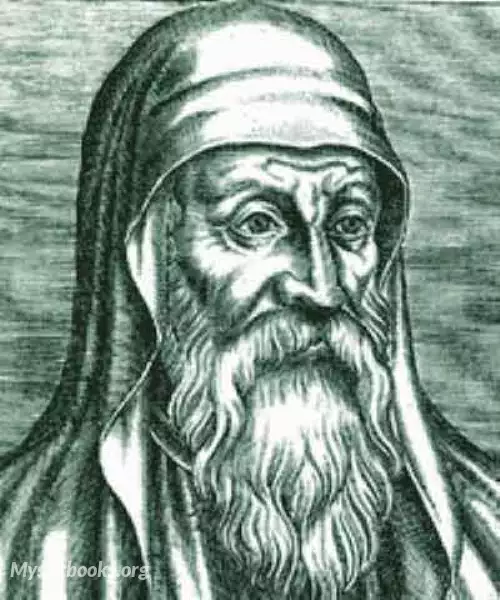
Timeline
Title
Country/Nationality
Origen of Alexandria
Origen of Alexandria also known as Origen Adamantius, was an early Christian scholar, ascetic, and theologian who was born and spent the first half of his career in Alexandria. He was a prolific writer who wrote roughly 2,000 treatises in multiple branches of theology, including textual criticism, biblical exegesis and hermeneutics, homiletics, and spirituality. He was one of the most influential and controversial figures in early Christian theology, apologetics, and asceticism. He has been described as "the greatest genius the early church ever produced".
Almost all information about Origen's life comes from a lengthy biography of him in Book VI of the Ecclesiastical History written by the Christian historian Eusebius (c. 260 – c. 340). Eusebius portrays Origen as the perfect Christian scholar and as a literal saint. Eusebius, however, wrote this account almost fifty years after Origen's death, and had access to few reliable sources on Origen's life, especially his early years. Anxious for more material about his hero, Eusebius recorded events based only on unreliable hearsay evidence, and frequently made speculative inferences about Origen based on the sources he had available. Nonetheless, scholars can reconstruct a general impression of Origen's historical life by sorting out the parts of Eusebius's account that are accurate from those that are inaccurate.
Origen was born in either 185 or 186 AD in Alexandria. Porphyry called him "a Greek, and educated in Greek literature". According to Eusebius, Origen's father was Leonides of Alexandria, a respected professor of literature and also a devout Christian who practised his religion openly. Joseph Wilson Trigg deems the details of this report unreliable, but admits that Origen's father was certainly at least "a prosperous and thoroughly Hellenized bourgeois".According to John Anthony McGuckin, Origen's mother, whose name is unknown, may have been a member of the lower class who did not have the right of citizenship. It is likely that, on account of his mother's status, Origen was not a Roman citizen. Origen's father taught him about literature and philosophy, and also about the Bible and Christian doctrine. Eusebius states that Origen's father made him memorize passages of scripture daily. Trigg accepts this tradition as possibly genuine, given Origen's ability as an adult to recite extended passages of scripture at will. Eusebius also reports that Origen became so learned about the holy scriptures at an early age that his father was unable to answer his questions.
Sometime between 238 and 244, Origen visited Athens, where he completed his Commentary on the Book of Ezekiel and began writing his Commentary on the Song of Songs. After visiting Athens, he visited Ambrose in Nicomedia. According to Porphyry, Origen also travelled to Rome or Antioch, where he met Plotinus, the founder of Neoplatonism. The Christians of the eastern Mediterranean continued to revere Origen as the most orthodox of all theologians, and when the Palestinian hierarchs learned that Beryllus, the bishop of Bostra and one of the most energetic Christian leaders of the time, had been preaching adoptionism (the belief that Jesus was born human and only became divine after his baptism), they sent Origen to convert him to orthodoxy. Origen engaged Beryllus in a public disputation, which went so successfully that Beryllus promised only to teach Origen's theology from then on. On another occasion, a Christian leader in Arabia named Heracleides began teaching that the soul was mortal and that it perished with the body.Origen refuted these teachings, arguing that the soul is immortal and can never die.
In c. 249, the Plague of Cyprian broke out. In 250, Emperor Decius, believing that the plague was caused by Christians' failure to recognise him as divine, issued a decree for Christians to be persecuted. This time Origen did not escape. Eusebius recounts how Origen suffered "bodily tortures and torments under the iron collar and in the dungeon; and how for many days with his feet stretched four spaces in the stocks". The governor of Caesarea gave very specific orders that Origen was not to be killed until he had publicly renounced his faith in Christ. Origen endured two years of imprisonment and torture, but obstinately refused to renounce his faith. In June 251, Decius was killed fighting the Goths in the Battle of Abritus, and Origen was released from prison. Nonetheless, Origen's health was broken by the physical tortures enacted on him, and he died less than a year later at the age of sixty-nine. A later legend, recounted by Jerome and numerous itineraries, places his death and burial at Tyre, but little value can be attached to this.
Books by Origen of Alexandria

Against Celsus Book 2
Against Celsus preserved entirely in Greek, is a major apologetics work by the Church Father Origen of Alexandria, written in around 248 AD, countering the writings of Celsus, a pagan philosopher and controversialist who had written a scathing attack...

Against Celsus Book 4
Against Celsus, preserved entirely in Greek, is a major apologetics work by the Church Father Origen of Alexandria, written in around 248 AD, countering the writings of Celsus, a pagan philosopher and controversialist who had written a scathing attac...

Against Celsus Book 5
Against Celsus preserved entirely in Greek, is a major apologetics work by the Church Father Origen of Alexandria, written in around 248 AD, countering the writings of Celsus, a pagan philosopher and controversialist who had written a scathing attack...

Against Celsus Book 6
The book is a continuation of Origen's rebuttal of Celsus' arguments against Christianity. Origen was a prominent early Christian theologian who lived in the third century AD. He was known for his extensive writings on Christian doctrine and for his...

Against Celsus Book 1
Against Celsus is an apologetic work by Origen of Alexandria, written in response to Celsus's attack on Christianity. Celsus accused Christians of being irrational, deluded, and unpatriotic. He also claimed that Jesus performed his miracles using bla...

Against Celsus Book 3
Against Celsus is a classic work of Christian apologetics written by Origen of Alexandria in the 3rd century AD. The book is a response to Celsus's "True Word," a treatise that attacked Christianity on a number of grounds, including its irrationality...

Against Celsus Book 7
Against Celsus is a Christian apologetic work by Origen of Alexandria, written around 248 AD. It is a response to Celsus's "The True Word", a scathing attack on Christianity. Origen's work defends Christianity against Celsus's charges of irrationalit...